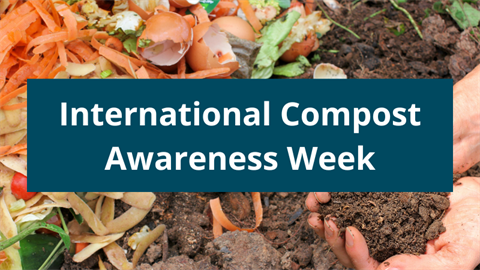International Compost Awareness Week 2024
Published on 09 May 2024

International Compost Awareness Week (ICAW) is celebrated nationwide and in other countries each year during the first full week of May. The goal of ICAW is to work together to raise public awareness on why we all should be composting our organics and using compost to create healthier soil.
Here are some key facts regarding organics recycling and compost use:
- The use of landfill space can be reduced by at least one-third when organics are recycled.
- Methane, a greenhouse twenty-five times as powerful as carbon dioxide, can be significantly reduced through the recycling of organics instead of their being landfilled.
- Soil health and productivity is dependent on organic matter – the essence of compost -- to provide the sustenance for the biological diversity in the soil.
- Compost offers a significant answer to climate change mitigation. Compost’s return to the soil serves as a “carbon bank,” helping to store carbon thereby removing it from the atmosphere.
- Compost is a huge benefit for both water conservation and quality. When used in water quality projects, compost bind pollutants to the organics material and prevents them from entering our lakes, wetlands, streams and rivers.
- By composting at home, the need for transporting of that waste is negated – thereby saving significantly on collection and processing costs.
So, what is composting?
Composting is the process of natural decomposition in which organic materials break down to become nutrient mulch which is great for your garden. For your compost to be a success, you need a combination of carbon-rich materials, known as ‘browns’, and nitrogen-rich materials, which are called ‘greens’. Your compost also requires oxygen and water, which are infused by turning your heap weekly and by adding moisture.
Brown material – dry leaves, plant stalks and shredded paper and cardboard
Green material – vegetable scraps. Grass clippings, coffee grounds
Not all household waste can be composted. As a general rule, if it looks like it may make your compost heap smell, attract pests or contain materials which don’t naturally break down, then don’t add it to your compost.
Things that can be composted at home – vegetable scraps, coffee grounds, crushed eggshells, grass clippings, leaves etc, small amounts of breadcrumbs, pasta and rice, shredded paper, pet fur, lint.
Things that shouldn’t be composted at home - fish and meat products, dairy products, diseased plants, pet faeces, fat, oil & grease, plastics.
